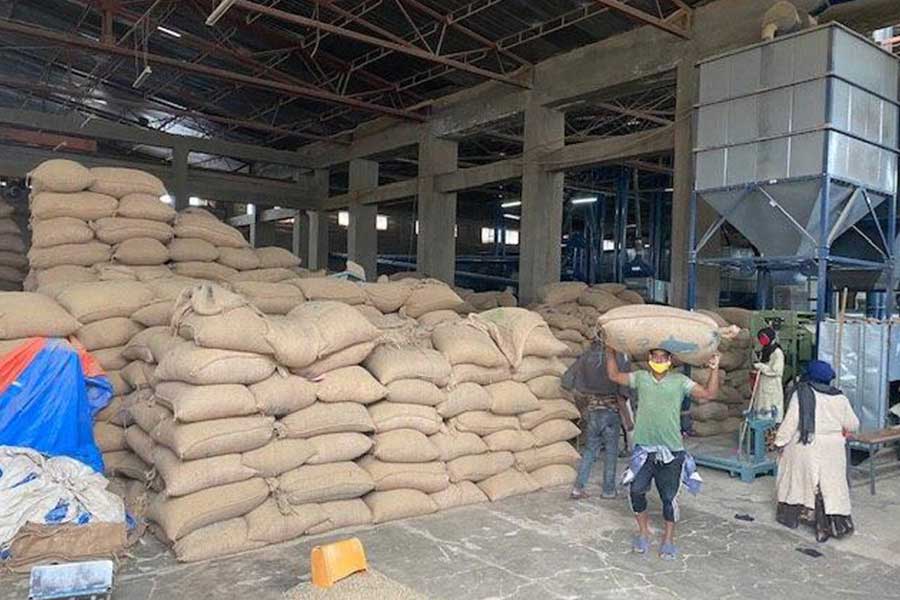
Viewpoints | May 11,2023
Authorities in the coffee sector plan to cement a procedure that enables exporters to buy the cash crop directly from suppliers outside the Ethiopian Commodity Exchange (ECX) floors, a system industry insiders call vertical integration.
They are encouraged by record-high export proceeds secured from coffee during the year, officials at the Ethiopian Coffee & Tea Authority said.
Several exporters have shifted to buying from suppliers, accounting for over half of coffee shipped during the year. In the last six months alone, close to 6,000 linkages have been created between farmers, collectors, and buyers through vertical integration, shipping 133,000tn of coffee overseas. Even though the initiative has been under implementation since 2017, the practice took off over the past year, necessitating the move to draft a directive to monitor and evaluate the export, according to Hayru Nuru, director for market information and supervision of Authority.
Coffee is Ethiopia’s main export crop, contributing to the livelihoods of more than six million smallholder farmers. The country exported 248,000tn last year, earning a record revenue of 907 million dollars.
Suppliers claim that vertical integration is partly responsible for the increase in exports, disrupting long supply chains and enabling the price of a kilogramme of coffee to rise by a dollar.
"The supply chain was very long, and brokers were making more money than suppliers and farmers," said Zerihun Kemiso, president of the Southern Region Coffee Suppliers Association. "Vertical integration has enabled farmers to reap the fruit of their hard work."
The directive gives the mandate of approving an agreement entered between suppliers and exporters to the Federal Document Authentication & Registration Agency. Approved contracts are to be submitted to the Authority, which will continue to follow up on permit holders. Suppliers and exporters can enter into a futures contract, too, with a two-year limit based on the regulation approved previously. The new directive does not authorise a contract signed between two parties to be terminated unless both parties wish to.
If any signing breaches the contract, their permits would be revoked, and the Authority can blacklist the party at fault. The decision would be communicated with agencies, including the ECX and the National Bank of Ethiopia. Suppliers or exporters found breaching contracts will not be allowed to use other options, including the ECX trading floor.
Coffee suppliers are expected to deliver the coffee to exporters at one of the country's Authority's 11 stations. The buyer is expected to make the full payment to the supplier in three days following the delivery; if not, the supplier must notify the Authority within five working days. But if the coffee is to be graded at the handover station, payment has to be made the same day.
In both cases, the Authority will determine the price of coffee.
The Authority hopes proceeds from coffee export will reach one billion dollars this year, further implementing the new directive. This is despite the fear of industry insiders that the new system may result in a monopoly.
"Vertical integration has the existing supply-chain unsettled, raising market prices and creating a monopoly in the system," said Anwar Ahmed, a commodities consultant.
PUBLISHED ON
Jul 18,2021 [ VOL
22 , NO
1107]

Viewpoints | May 11,2023

Agenda | Jul 18,2020

Fortune News | Jun 15,2024

Radar | Jun 15,2019

Radar | Feb 10,2024

Fortune News | Apr 06,2019

Radar | Apr 22,2022

Fortune News | Oct 17,2020

Fortune News | Nov 06,2021

Radar | May 13,2023

Dec 22 , 2024 . By TIZITA SHEWAFERAW
Charged with transforming colossal state-owned enterprises into modern and competitiv...

Aug 18 , 2024 . By AKSAH ITALO
Although predictable Yonas Zerihun's job in the ride-hailing service is not immune to...

Jul 28 , 2024 . By TIZITA SHEWAFERAW
Unhabitual, perhaps too many, Samuel Gebreyohannes, 38, used to occasionally enjoy a couple of beers at breakfast. However, he recently swit...

Jul 13 , 2024 . By AKSAH ITALO
Investors who rely on tractors, trucks, and field vehicles for commuting, transporting commodities, and f...

Jun 28 , 2025
Meseret Damtie, the assertive auditor general, has never been shy about naming names...

Jun 21 , 2025
A well-worn adage says, “Budget is not destiny, but it is direction.” Examining t...

Jun 14 , 2025
Yet again, the Horn of Africa is bracing for trouble. A region already frayed by wars...

Jun 7 , 2025
Few promises shine brighter in Addis Abeba than the pledge of a roof for every family...